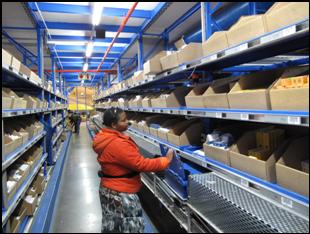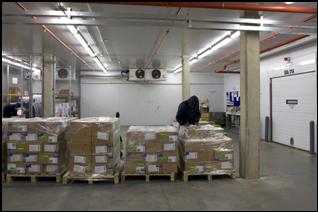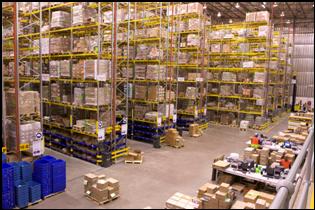UTi’s Topnotch Pharma Operation
Johannesburg, South Africa
February 11, 2010
By
Richard Armstrong
Key Personnel:
Holger Eckoldt, Chief Executive Officer
Stuart Murray, Chief Executive Officer, Chronic Solutions Company
Warren Elsworth, Chief Financial Officer
Rob Botha, Chief Operating Officer
Mark Forrest-Smith, Consumer Healthcare Executive
Murray Clark, Marketing & Sales Executive
Richard Nkuna, Human Resources Executive
Edwin Ukama, Executive Assistant
UTi Pharma dominates the private sector pharmaceutical market in South Africa controlling over 50% of the total prescription pharmaceutical business. As a third-party logistics provider (3PL), UTi does direct distribution connecting major pharmaceutical companies to pharmacies, doctors and other end users. Under its core model, drug wholesale/distribution companies are eliminated. UTi receives the prescription drugs from 31 clients including eight of the top 10 pharmaceutical manufacturers. UTi then takes orders through its call center and website. UTi handles the orders, manages the inventory, delivers the drugs, collects the money and pays the pharmaceutical manufacturers.
The major alternative to UTi’s “Direct Distribution” model is the pharmaceutical wholesale distributor who buys pharmaceuticals from drug companies and then resells them to pharmacies and hospitals. In the U.S., wholesale/distribution middlemen dominate the pharmaceutical supply chains except for instances where larger retail chains like Walgreens and CVS buy direct. The major pharmaceutical wholesale distributors are Cardinal Health, McKesson and AmerisourceBergen.
The wholesale distributor model is still present in South Africa but most of its activity is now part of vertically integrated companies who own pharmacy chains and supply chain functions. Vertical integration helps companies stay competitive with direct distribution operations which save 10% to 12% of supply chain costs when compared to wholesale distributors. Direct Distribution cuts out the “buy and resell” step which is basic to the wholesale distributor model.
UTi Direct Distribution

The money saving “Direct Distribution” model got started in South Africa in 1994. Backed by four committed CEO’s from the pharmaceutical manufacturers, UTi’s CEO Holger Eckoldt led efforts to get Direct Distribution working. South Africa held its first democratic, post apartheid elections in 1994. At the same time, drug wholesale distributors refused to accept changes brought by the new order. A boycott was led by UPD which is now owned by the parent of the major pharmacy chain Clicks Pharmacy. UPD and other drug wholesalers bought up the supply of most prescription drugs and withheld them from the South African public for the first half of 1994. After six months, a combination of major pharmaceutical companies broke the logjam by supplying drugs to the public through direct distribution.
In 1996, South Africa adopted a Health Policy. In 1997, the Medicines Control Act was revised and in 2004, price regulation was established. Prescription drugs are now sold at single exit (fixed) prices which are modified yearly. Under consideration is setting the logistics fees associated with pharmaceuticals distribution.
UTi Pharma – Major Customers

Fifteen years after the new democracy was formed, South Africa has two pharmaceutical sectors. The governmental healthcare (public) sector covers 85% of South Africans (40.5 million people) at a pharmaceutical cost of $470 million. The private sector covers 15% of the population (7.4 million people) at a pharmaceutical cost of $2.83 billion. Over-the-counter, generics off patent and original branded products add $2.8 billion.¹ About 15% to 20% of the public sector drugs “go missing” from governmental warehousing and transportation vehicles.²
UTi Pharma’s clients’ (pharma manufacturers) sales are over $2 billion of this total. Annually, 1.8 million invoices are cut by UTi and 2.8 million parcels are delivered. Retail level customers (doctors, hospitals, etc.) exceed 5,000. UTi’s top 10 customers account for about 50% of revenues, which will be $90 million in 2010.
UTi Pharma Infrastructure
UTi Pharma has 1,000 employees. Holger Eckoldt, CEO, has a core group of managers but he is the master of creation and execution for this company. Eckoldt, 63 years old, was raised in Germany but lived and worked for years in Canada, Brazil and Singapore. Sales, marketing and financial management are exceptional in this operation. Operations and execution are very good for South Africa. Eckoldt transitioned his core team from IHD when UTi purchased it in 2004 and renamed it in 2008.
For UTi Pharma, Johannesburg is the corporate control center with three major locations and 412,000 sq. ft. (38,280 m²) of space. There are important regional distribution centers in Cape Town, Durban and Port Elizabeth. All locations are ISO 9000 Certified and governmentally licensed. Deliveries throughout South Africa are handled daily by 80 one-ton trucks supplied by five contractors. Special carriers are used for certain “no-go” areas. All delivery trucks are GPS monitored. Blind tracking units are hidden on each truck and assistants are sent with drivers as necessary. Thirty deliveries are average for vehicles in metro areas. Not surprisingly, productivity in delivery and warehousing operations is affected by the top operational priority-security. In addition to its South African business, UTi Pharma exports to eight surrounding countries.
UTi’s Linbro Distribution Center
 Linbro is the primary facility for most UTi Pharma functions. It has 22,400 m² (241,000 sq. ft.) of space. Linbro uses 1.2 x 1 meter pallets (48″ x 40″ in the U.S.). Product is picked according to FEFO (first expired first out). Batches of product are separated by pallet locations.
Linbro is the primary facility for most UTi Pharma functions. It has 22,400 m² (241,000 sq. ft.) of space. Linbro uses 1.2 x 1 meter pallets (48″ x 40″ in the U.S.). Product is picked according to FEFO (first expired first out). Batches of product are separated by pallet locations.
Facilities are camera controlled and entrance to the warehouse, and controlled locations within it, is by finger print identification devices. No cell phones are allowed.
The warehouse management system (WMS) “Delta” was built by IHD (UTi Pharma’s predecessor). It is designed to cover all of the operating idiosyncrasies of the multi-faceted UTi warehouses.
Individual item “fine picking” is done by using voice picking technology which replaced pick to light systems at Linbro. Staff members are paid extra for picking accuracy.
Picked items are collected in blue plastic containers/trays. The containers traverse the seven loop conveyor systems to key locations until orders are filled. Containers are bar coded and auto reading routes them through the system.
Completed containers are forwarded to security checking, packed and labeled for distribution.
Linbro was operating at capacity at the time of our visit.
UTi’s Longmeadow Warehouse
 UTi Pharma increased its capacity by opening the Longmeadow warehouse in September 2006. This 18,640 m² (201,000 sq. ft.) facility is primarily a case/pallet pick warehouse for FMCG (fast moving consumer goods). Fifteen hundred different FMCG products are stored using “A”, “B”, “C” locations. Cold chain pharmaceuticals and diagnostic apparatuses are also handled at this location. There are 14 receiving doors with two dedicated to cold chain receiving. The cold storage area including receiving is 2,100 m². Most cold products are stored in half pallet locations.
UTi Pharma increased its capacity by opening the Longmeadow warehouse in September 2006. This 18,640 m² (201,000 sq. ft.) facility is primarily a case/pallet pick warehouse for FMCG (fast moving consumer goods). Fifteen hundred different FMCG products are stored using “A”, “B”, “C” locations. Cold chain pharmaceuticals and diagnostic apparatuses are also handled at this location. There are 14 receiving doors with two dedicated to cold chain receiving. The cold storage area including receiving is 2,100 m². Most cold products are stored in half pallet locations.
Cold chain products are elevated using Hanel Lean lifts to the mezzanine level (4,000 m²) where they are stored and picked. Frozen products are shipped throughout South Africa in 17 liter and 400 liter containers packaged with dry ice.
The mezzanine level at Longmeadow is used for cold chain and fine (individual items) picking. Non-cold fine picking at this location is mostly for non-prescription FMCG.
It is fairly standard in South Africa to allow orders with single items even for non-pharmaceuticals. This leads to a host of mixed orders on pallets of cartons plus single items. In part, this happens because of a large amount of small customers. (There are still a host of small pharmacies but about half of them have gone out of business as the market matures and retail chains displace the “mom and pops”.)


As in Linbro, pharmaceuticals received are placed in quarantine, checked by on-staff pharmacists and then moved into the warehouse and dispersed. Diagnostic merchandise is normally reshipped within a week.
There are 12 outbound doors at Longmeadow. Eight-ton trucks shuttle outbound shipments to Linbro for consolidation and reshipment to destination. Longmeadow operates with 92 people on two shifts.
UTi’s Chronic Solutions Company
Chronic Solutions Company (CSC) is a specialized division of UTi Pharma. Its principal business is supplying oncology centers with drugs for chemotherapy which are part of 12,500 pharmaceutical products handled by CSC.
Operations are somewhat inconveniently spread over five buildings with the largest occupying 2,953 m² (31,800 sq. ft.). Operations are dominated by fine picking using 14 A-frame racks. On-site pharmacists fill about 2,000 prescriptions per day for chronic care and oncology patients.
About 1,600 pharmaceutical package shipments a day are made using the FedEx agent Super Swift. FedEx Super Swift makes two pickups daily. The most common destinations are oncology clinics and private residences.
A secondary business for CSC is the distribution of contact lenses for Novartis–Ciba Vision. About 20,000 soft contact lenses are stocked. Replenishment is from Frankfurt. UTi handles all supply chain functions, including collection and demand forecasting. All of the lenses are serially coded. Six hundred orders a day are filled.
Stuart Murray, CEO of CSC, expects his business to play an expanded role going forward as pharmaceuticals evolve toward individualized, bio-design drugs. Individualization of pharmaceuticals will create an extensive array of new “fine” handling value-added services.
Major Competitors
PHD
Tour Guide: Ishmael Muchemenyi, Head of Operations – International
Introduction
PHD was established in March 2000 as a multi-channeled direct distribution service provider for pharma companies.
PHD distributes in excess of 1.7 million units per month, which translates into over 324 tons of pharmaceutical product. The Western Cape, Eastern Cape and Kwa-Zulu Natal regions are serviced by PHD’s branches located in Durban, Cape Town and Port Elizabeth. The balance of PHD’s distribution is done out of the Central Distribution Centre (CDC) / Head Office facility, based in Centurion, Gauteng near Johannesburg.
Where possible, PHD has centralized the activities that are core activities to the provision of distribution service. PHD’s customer care, orders, credit management and returns functions are all based at the Centurion CDC facility.
PHD reaches more than 9,000 delivery points on behalf of more than 30 manufacturers. PHD services medical practitioners, hospitals, clinics, state, pharmacies, health shops, wholesalers and retailers.
PHD is a division of the Fuel Group of companies and makes extensive use of the services of its sister companies, such as RTT, SOS, Supply Chain Services, Reach and Revert.
The owner, since July 2007, has been private equity firm Actis. Twenty-five percent of the equity is from the Black Economic Empowerment (BEE) ownership arranged through Makalini Holdings.
Infrastructure
PHD is building a new 14,500 m² facility next to its 9,500 m² facility in Centurion. The current facility is at 98% capacity (3,500 bulk pallet positions). European standard pallets are used. Aspen/GlaxoSmithKline is PHD’s largest customer. The new warehouse and the current one will be connected by a conveyor line. The current warehouse will be used for bulk storage and picking operations will be moved to the building.
Putaway is done by scanning. However, picking is manual. Batches are kept separate and sometimes one box occupies a pallet position. The returns area is 400 sq. ft. Product involves a lot of FMCG and turns average 12 a year. PHD’s primary business is public sector bulk orders. A significant amount of retroviral (aids) drugs are handled in a separate building. SCMS, a U.S. based HIV/AIDS charity provider, is a major customer. PHD keeps three people in the DC to coordinate with them. PHD provides service to surrounding countries for SCMS and other customers.
PHD workers are dressed in color coded suits to help maintain security control within its warehouse in Centurion. PHD receives about 600 pallets of product a day.
Pickers in the warehouse do not know who the customers are. Order checkers in purple suits who receive picked containers are in a fenced area. They verify orders, put invoices in cartons with the shipments and label the cartons. Fine picking is done from A-frames on a second story mezzanine level.
Products received at PHD’s warehouse go into quarantine. All products are cleared by pharmacists within two days. There are 10 pharmacists, 550 total employees, and 350 warehouse employees in PHD’s operations.
The warehouse has caged areas for Schedule 6 (narcotics) and cold storage areas at 2° to 8°. Cold chain products are shipped in styrofoam boxes with dry ice. The WMS used for putaway and location controls is SAP.
RTT, PHD’s sister company, runs 20 to 30 trucks a day for bulk (public healthcare) deliveries.
Additional Comments of Ishmael Muchemenyi
In essence, PHD has two main focus areas: the commercial business (in the Centurion warehouse) and the donor funded project where we constitute the warehousing arm of Supply
Chain Management Systems which is a conglomerate of various non-governmental organizations (NGOs) who came together to procure, supply and distribute antiretroviral drugs (ARVs) across Africa under the PEPFAR (President’s Emergency Plan For Aids Relief) project.
PHD provides the warehousing capability in Africa with its network of regional hubs, strategically positioned in Ghana for the West African region, Kenya for the East African region and the bond store in South Africa (which is not part of the main Centurion warehouse A&A toured) serving the Southern cone of Africa.
UPS Supply Chain Solutions is responsible for our transportation within this project across Africa and none of our sister companies are involved in the work we do outside of South Africa at this stage.
Both our facilities in Ghana and Kenya are being expanded to accommodate more products as we seek to convert them from merely supporting the donor funded project to taking on a commercial function ─ along exactly the same lines witnessed in Centurion warehouse during the tour.
DHL Supply Chain – Healthcare Focus
DSC Healthcare operates a 6,500m² warehouse in the Elandsfontein suburb of Johannesburg. There are 4,700 rack positions and 200 m² of 2° to 8°C chilled space. The warehouse is fully air-conditioned. Like most South African warehouses we visited, this one has a stand by generator for electrical power. Based at the warehouse, are 14 one-ton light delivery vehicles. The operation uses a network of cross-dock third parties on the coastal regions. The facility houses various dedicated healthcare clients in separate parts of the warehouse that share some overhead costs and synergy on transport.
The operation is headed up by Alan Burgess, who is a no-nonsense operations man, who drives rigor into processes and very tight stock control.
The Netcare Hospital Group was signed by DHL in 2006 and is the main focus of this healthcare operation. Netcare has 105 hospitals and clinics in South Africa. In 2007, DHL signed Bausch & Lomb and took over its South African contact lens and solutions business. This is an intricate challenge, considering the small size of each delivery and the extensive number of Optoms and eye clinics that require drops throughout the Republic of South Africa. In 2008, DHL added the Nativa business to its healthcare operations. In 2009, Burgess signed BARD SA, a medical devices company.
DSC Healthcare moved away from the “Pharma-Direct” model of fine distribution (unit picking and providing multiple deliveries per day in a shared client operation). The previous DSC Healthcare business was Kinesis Logistics and was formed by various multinationals including Pfizer (and then Warner Lambert), GlaxoSmithKline and Aspen Pharmacare in 2000.
DSC Healthcare has all the necessary licenses including the MCC (Medical Control Council), Department of Health and Pharmacy Council. There are three registered pharmacists on hand.
Burgess plans on leveraging off the BARD SA account to gain more medical devices business and expand hospital logistics capabilities. The DSC Healthcare operation is capable of a wide range of services and this flexibility is proving to be very valuable to its clients.
New UPD
New UPD is the underlying wholesale distribution arm for the Click Group. There are over 200 Clicks Pharmacy’s plus other, sister retail shops in South Africa. Clicks opened its first pharmacy in 2004 when regulatory reform allowed for corporate ownership of retail pharmacies. UPD has five DCs including the Lea Glen Pharma DC which cost it R45 million and has automated picking. The DC is 20,250 m² – 4,000 m² are used for pharma and 16,250 m² are used for FMCG. There are 13,752 stock keeping units (SKUs) and 360 employees. A total of 2,000 customers place 95,000 orders a month.
UPD is primarily part of a vertically integrated operation whose mission is to operate profitable drug stores. However, it does have a 3PL, UPD Specialized Distribution, and a dedicated distribution division for once and twice a day deliveries depending on the location within South Africa.
UPD was founded in 1993. In 1999, it was acquired by a consortium and renamed New UPD. New Clicks acquired UPD in 2003. UPD provides exclusive distribution for hospital chains LifeHealth Care and Mediclinic.
As mentioned previously, UPD was the main culprit in the famous drug boycott of 1993-1994. UPD had 60% of the drug wholesale market at the time. UPD and other wholesalers bought up and held all of the prescription drugs coming into the country. The boycott lasted for a half year and helped create big pharma’s need for the direct to customer approach used by UTi and PHD.
¹ Source: www.adcock.com
² South Africa has huge security issues and its share of sophisticated, organized crime.
Sources: A&A Primary Research, https://www.us.dsv.com


